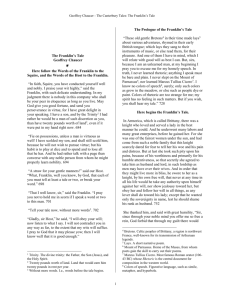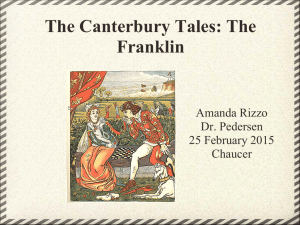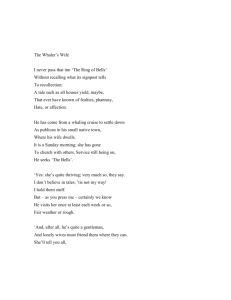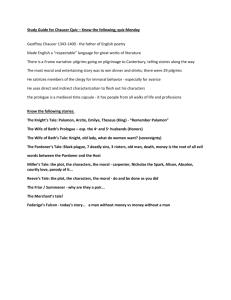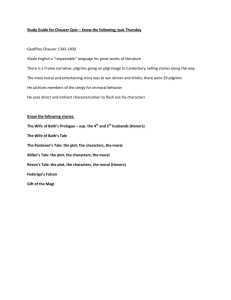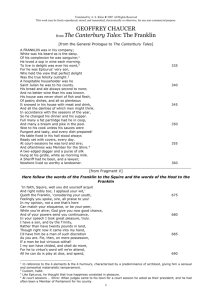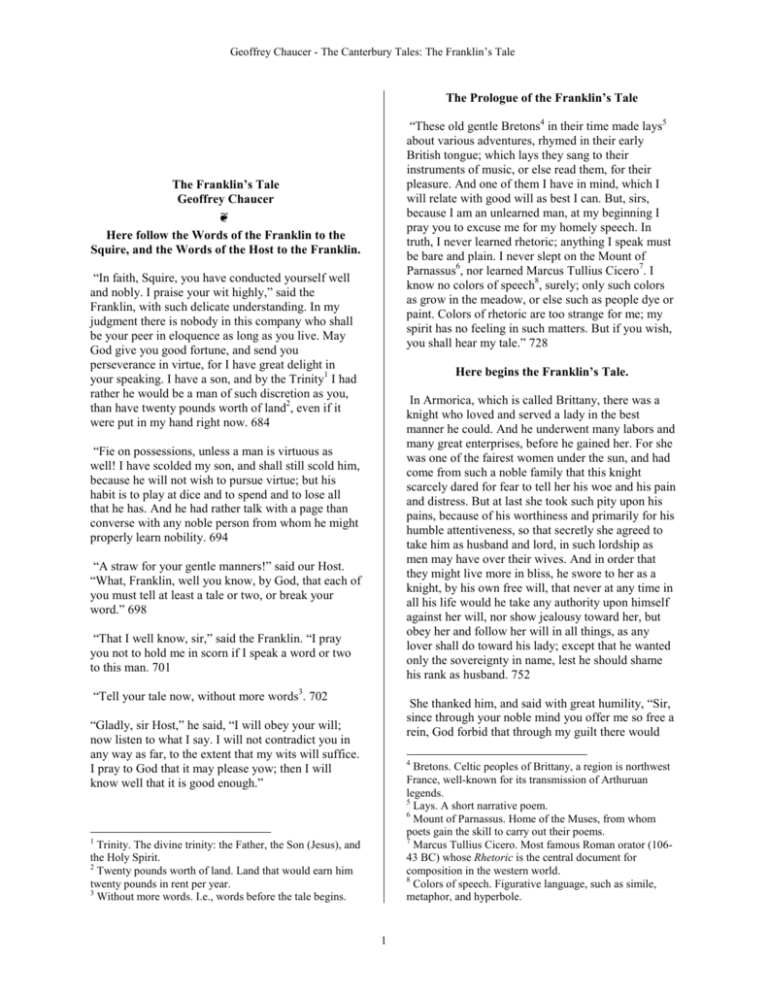
Geoffrey Chaucer - The Canterbury Tales: The Franklin’s Tale
The Prologue of the Franklin’s Tale
“These old gentle Bretons4 in their time made lays5
about various adventures, rhymed in their early
British tongue; which lays they sang to their
instruments of music, or else read them, for their
pleasure. And one of them I have in mind, which I
will relate with good will as best I can. But, sirs,
because I am an unlearned man, at my beginning I
pray you to excuse me for my homely speech. In
truth, I never learned rhetoric; anything I speak must
be bare and plain. I never slept on the Mount of
Parnassus6, nor learned Marcus Tullius Cicero7. I
know no colors of speech8, surely; only such colors
as grow in the meadow, or else such as people dye or
paint. Colors of rhetoric are too strange for me; my
spirit has no feeling in such matters. But if you wish,
you shall hear my tale.” 728
The Franklin’s Tale
Geoffrey Chaucer
❦
Here follow the Words of the Franklin to the
Squire, and the Words of the Host to the Franklin.
“In faith, Squire, you have conducted yourself well
and nobly. I praise your wit highly,” said the
Franklin, with such delicate understanding. In my
judgment there is nobody in this company who shall
be your peer in eloquence as long as you live. May
God give you good fortune, and send you
perseverance in virtue, for I have great delight in
your speaking. I have a son, and by the Trinity1 I had
rather he would be a man of such discretion as you,
than have twenty pounds worth of land2, even if it
were put in my hand right now. 684
Here begins the Franklin’s Tale.
In Armorica, which is called Brittany, there was a
knight who loved and served a lady in the best
manner he could. And he underwent many labors and
many great enterprises, before he gained her. For she
was one of the fairest women under the sun, and had
come from such a noble family that this knight
scarcely dared for fear to tell her his woe and his pain
and distress. But at last she took such pity upon his
pains, because of his worthiness and primarily for his
humble attentiveness, so that secretly she agreed to
take him as husband and lord, in such lordship as
men may have over their wives. And in order that
they might live more in bliss, he swore to her as a
knight, by his own free will, that never at any time in
all his life would he take any authority upon himself
against her will, nor show jealousy toward her, but
obey her and follow her will in all things, as any
lover shall do toward his lady; except that he wanted
only the sovereignty in name, lest he should shame
his rank as husband. 752
“Fie on possessions, unless a man is virtuous as
well! I have scolded my son, and shall still scold him,
because he will not wish to pursue virtue; but his
habit is to play at dice and to spend and to lose all
that he has. And he had rather talk with a page than
converse with any noble person from whom he might
properly learn nobility. 694
“A straw for your gentle manners!” said our Host.
“What, Franklin, well you know, by God, that each of
you must tell at least a tale or two, or break your
word.” 698
“That I well know, sir,” said the Franklin. “I pray
you not to hold me in scorn if I speak a word or two
to this man. 701
“Tell your tale now, without more words3. 702
She thanked him, and said with great humility, “Sir,
since through your noble mind you offer me so free a
rein, God forbid that through my guilt there would
“Gladly, sir Host,” he said, “I will obey your will;
now listen to what I say. I will not contradict you in
any way as far, to the extent that my wits will suffice.
I pray to God that it may please yow; then I will
know well that it is good enough.”
4
Bretons. Celtic peoples of Brittany, a region is northwest
France, well-known for its transmission of Arthuruan
legends.
5
Lays. A short narrative poem.
6
Mount of Parnassus. Home of the Muses, from whom
poets gain the skill to carry out their poems.
7
Marcus Tullius Cicero. Most famous Roman orator (10643 BC) whose Rhetoric is the central document for
composition in the western world.
8
Colors of speech. Figurative language, such as simile,
metaphor, and hyperbole.
1
Trinity. The divine trinity: the Father, the Son (Jesus), and
the Holy Spirit.
2
Twenty pounds worth of land. Land that would earn him
twenty pounds in rent per year.
3
Without more words. I.e., words before the tale begins.
1
Geoffrey Chaucer - The Canterbury Tales: The Franklin’s Tale
ever be war or contention between us two. Sir, I will
be your true humble wife until my heart break; take
here my pledge.” Thus they were both in quiet and
peace. 760
Now I will leave Arveragus, and will speak of
Dorigen his wife, who loved her husband as her
heart’s blood. For in his absence she wept and sighed,
as these noble wives do (when they will). She
mourned, watched, wailed, fasted, lamented; desire
for his presence so distracted her that she cared
nothing for the whole wide world. Her friends, who
knew her heavy thoughts, comforted her in all they
could. They preached to her; day and night they told
her that she was slaying herself for no good reason,
alas! And they comforted her all they could, to make
her leave her heaviness. 828
For one thing, sirs, I dare safely say, friends must
comply with one another, if they wish to keep
company long. Love will not be constrained by
mastery; when mastery comes, the god of love soon
beats his wings, and, farewell, he is gone! Love is as
free as any spirit. Women by their nature desire
liberty and not to be under constraint like a servant;
and so do men, if I shall tell the truth. Look who is
most patient in love, he has the advantage over all.
Patience is a high virtue, certainly; for, as these
scholars say, it conquers things that force could never
reach. 775
Through the process of time, as you all know, one
may engrave in a stone so long that some figure will
be imprinted on it. They comforted her so long that,
with the aid of hope and reason, she received the
imprint of their consolation. Through this her great
sorrow began to assuage; she could not continue
forever in such frenzy. 836
Men should not scold or complain at every word.
Learn to endure, or else, on my life, you shall learn
this, whether you wish to or not. For certainly there is
nobody in this world who sometimes does not act or
speak amiss. Wrath, sickness, the constellation, wine,
woe, changing humors, very often cause a man to act
or speak amiss. 783
And while she was in all this sorrow, Arveragus had
sent home to her letters telling of his welfare, and that
he would soon return; otherwise, this sorrow would
have slain her heart. Her friends saw her sorrow
began to slacken, and on their knees begged her for
God’s love to come and roam about with them, to
drive away her dark imaginings. And finally she
agreed, for well she saw that it was best. 846
A man may not be avenged of every wrong; in every
creature who knows how to rule his life, there must
be moderation, according to the occasion. And
therefore, so that he might live at ease, this wise
worthy knight promised patience toward her, and she
seriously swore to him that there never should be a
fault in her. Here one may see a humble and wise
agreement; thus she took her servant and her lord:
servant in love, and lord in marriage. Then he was in
both lordship and servitude. Servitude? No, but
superior in lordship, since he has both his ]ady and
love; surely, his lady, and his wife as well, who
accepted that law of love. And in this happy state he
went home with his wife to his country, not far from
Penmark, where his dwelling was, and where he lived
in happiness and comfort. Who, unless he had been
wedded, could tell the joy, the comfort, and
wellbeing between husband and wife? 805
Now her castle stood near to the sea, and for a
diversion she often walked with her friends high
upon the bank, from which she saw many ships and
barges sailing on their course, wherever they would
go. But then that became a part of her grief. For often
she said to herself, “Alas! Is there no ship of so many
that I see that will bring home my lord? Then my
heart would be fully cured of its bitter, bitter pains.”
856
Another time she would sit there and ponder, and
from the shore cast her eyes down. But when she saw
the grisly black rocks, her heart would so quake for
true fear that she could not hold herself on her feet.
Then she would sit down on the grass and piteously
look into the sea, and with sorrowful, cold sighs say
just so: “Eternal God, who through Your providence
guides the world by sure government, You make
nothing in vain, as they say. But, Lord, these grisly,
fiendish, black rocks, which seem more like a foul
chaos of work than any fair creation by such a
perfect, wise, and unchanging God: why have You
created this irrational work? For by this work neither
man nor bird nor brute is benefited, south or north,
east or west. 874
This blessed condition lasted a year and more, until
the knight of whom I speak, who was called
Arveragus of Kayrrud, laid his plans to go and dwell
a year or two in England, which also was called
Britain, to seek worship and honor in arms, for he set
all his pleasure on such toils. And he dwelt there two
years, as the book says9. 813
9
As the book says. The alleged but unnamed source of the
Franklin’s story.
2
Geoffrey Chaucer - The Canterbury Tales: The Franklin’s Tale
“It does no good, in my mind, but harm. Do You not
see, Lord, how it destroys mankind? Although they
may not be remembered, rocks have slain a hundred
thousand bodies of mankind, which is such a fair a
part of Your work that You made it in Your own
image10. Then it should seem You had a great
fondness toward men; but how then may it be that
You created to destroy them in such a way that do no
good, but always harm? I know well that scholars
will say as they please by arguments that all is for the
best, though I cannot understand their reasons. But
may the same God that made the wind blow protect
my lord! This is my conclusion; I leave all
disputation to scholars. But I wish to God that all
these black rocks were sunk into hell, for his sake!
These rocks slay my heart for fear.” Thus she would
speak to herself, with many piteous tears. 894
beloved and held in great honor. And in short, if I am
to tell the truth, this servant to Venus11, this lively
squire, who was called Aurelius, had loved Dorigen,
entirely without her knowledge, more than any
creature for two years and more, as it happened, but
never dared he tell her his woe. He drank all his
penance without a cup12. 942
He was in despair, he dared say nothing except that
in his songs he would reveal his woe to some degree,
as in a general complaining; he said he loved, and
was in no way beloved. Of such matter he made
many lays, songs, complaints, roundels, and
virelays13, about how he would dare not utter his
sorrow, but languishes like a fury in hell; and die he
must, he said, as did Echo for Narcissus14, who dared
not tell her woe. In other manner than this that I
speak of he dared not reveal his passion to her;
except that, by chance, sometimes at dances, where
young people perform their customs of courtship, it
may well be that he looked upon her face in such a
way as a man who asks for grace; but she knew
nothing of his intent. 959
Her friends saw that it was no diversion for her, but
only a discomfort, to walk by the sea, and devised for
her amusements in other places. They led her by
rivers and springs and in other delightful places; they
danced and they played at chess and backgammon.
900
Nevertheless it happened, before they went from that
garden, that because he was her neighbor and a man
of good reputation, and she had known him for a long
time, they began to speak. And Aurelius drew more
and more toward his matter and when he saw his
time, he said thus: “Madame, by God That made this
world, If I had known it would gladden your heart, I
wish that the day when your Arveragus went over the
sea, I, Aurelius, had gone to a place from which I
never should have returned15. For I well know that
my service is in vain; my reward is but the breaking
of my heart. Have pity upon my bitter pains,
Madame, for with a word you may slay me or save
me. I wish to God that I were buried here at your
feet! I have now no time to say more; have mercy,
sweet, or you will cause me to die!” 978
So one day in the morning, they went to amuse
themselves for the entire day in a nearby garden, in
which they had made their provision of food and
other things. This was on the sixth morning of May,
and May with his soft rains had painted this garden
full of leaves and flowers. And truly the craft of
man’s hand had so curiously arrayed this garden that
never was a garden of such beauty, unless it would be
paradise itself. 912
The scent and the fresh sight of flowers would have
gladdened any heart that was ever born, unless too
great a sickness or too great a sorrow distressed it; so
full was it of delight and beauty. 917
After dinner they began to dance and sing, except
Dorigen, who always made complaint or moan,
because she saw not her husband and also her love
enter into the dance. But nevertheless she must wait
for a time and with good hope let her sorrow pass.
924
11
Venus. Goddess of love.
Drank his penance without a cup. Had his share of
sorrow.
13
Lays . . . complaints, roundels, and virelays. Lays: short
narrative poems. Complaints: poems that lament the
troubles of love. Roundels: short poems, usually on light
subjects and containing a refrain. Virelay: a variant on the
roundel. Roundels and virelays were likely composed for
dance as well.
14
Echo for Narcissus. Narcissus, the beautiful youth, who
pined away for love of his own reflection in a pool, was
loved by Echo, who, because her love was unrequited, died
of grief.
15
Never should have returned. I.e., that he would have
died.
12
Upon this dance, among other men, there danced
before Dorigen a squire who was fresher and more
joyful in apparel than is the month of May, I believe.
He sang and danced to surpass any man who is or
was since the world was made. He was, if one would
describe him, one of the most handsome men alive:
young, strong, virtuous, rich, and wise; and well
10
In Your own image.
3
Geoffrey Chaucer - The Canterbury Tales: The Franklin’s Tale
She looked at Aurelius: “Is this your desire?” she
said. “Is this what you wish to say? Never before did
I know what was in your mind. But now, Aurelius, I
know it. By that God that gave me breath and soul,
never in word or deed shall I be an untrue wife. As
long as I have any senses, I will be his to whom I am
bound. Take this for my final answer.” 987
lost. Behold, lord, my lady has decreed my guiltless
death, unless your kindness should have some pity
upon my dying heart. For well I know, lord Phoebus,
that you may help me best of all except my lady, if
you wish. Now promise to hear me tell you in what
way I may be helped. 1044
“Your blessed sister, Lucina17 the bright, chief
goddess and queen of the sea (though Neptune has
his godhead in the sea, yet is she empress over him),
you well know, lord, that just as it is her desire to be
kindled and lightened by your orb, for which reason
she follows you eagerly, so too the sea desires by its
nature to follow her, being goddess both in the sea
and in rivers great and small. 1054
But in sport after that she said, “Aurelius, by the
high God in heaven, yet would I consent to be your
love, since I see you so piteously lamenting.
Whenever that day comes that all along the coast of
Brittany you remove all the rocks, stone by stone, so
that they no longer obstruct the passage of ship or
boat--I say, when you have made the coast so clear of
rocks that there is no stone to be seen, then I will love
you best of all men. Take here my pledge, in all that I
can ever do.” 998
“Therefore, Lord Phoebus18, this is my prayer:
perform this miracle or break my heart; that now at
this next opposition, which shall be in the sign of the
Lion19, pray Lucina to bring a flood so great that it
shall rise above the highest rock in Armorican
Britanny by at least five fathoms, and let this flood
last two years. 1062
“Is there no other mercy in you?” he said. 999
“No,” she said, “by that Lord that made me! For I
well know that shall never happen. Let such follies
pass out of your heart. What delight should a man
ever have to go about loving the wife of another man,
who has her body whenever he wishes?” 1005
“Then, certainly, I may say to my lady, ‘Keep your
promise, the rocks are gone.’ Lord Phoebus, do this
miracle; ask her to go the same speed as you; I say,
ask your sister that these two years she will go no
faster in her course than you. Then shall she always
be exactly at full, and the spring flood-tide will last
day and night. And if she will not promise to grant
me my dear sovereign lady in such a manner, pray
her to sink every rock into her own dark region under
the ground where Pluto20 dwells, or nevermore shall I
gain my lady. Barefoot I will go a pilgrimage to your
temple at Delphi21. Lord Phoebus; see the tears on my
cheeks, and have some pity on my pains.” 1079
Aurelius gave many sore sighs. He was woeful when
he heard this; and with a sorrowful heart he
answered, “Madame, this would be impossible! Then
I must die of a sudden and horrible death.” And with
that word he turned back. 1011
Then many of her other friends came roaming up
and down in the paths, and knew nothing of this
affair, but speedily began new revel; until the bright
sun lost his hue, and the horizon had taken away from
him his light (this is as much as to say, it was
evening). And they went home in joy and
contentment, except, alas, wretched Aurelius alone!
He went to his house with sorrowful heart; he saw
that he could never escape death, and felt his heart
grow cold. Up to the heaven he held his hands and set
himself down on his bare knees, and raving said his
prayer; for true woe he was out of his wits and knew
not what he spoke. 1028
And with that he fell down in a swoon and for a long
time lay in a trance. His brother, who knew his
trouble, caught him up and brought him to his bed. In
this woe and torment I let this woeful creature lie in
despair. He may choose, as far as I am concerned,
whether he will live or die. 1086
Arveragus was come home, with other valiant
knights, in health and great honor as the flower of
chivalry. Oh, now you are happy, Dorigen, who has
in your arms your lively husband, the vigorous
knight, the valiant warrior, who loves you as his own
With piteous heart he began his complaint to the
gods, and first to the sun: “Apollo16,” he said, “lord
and ruler of every plant, herb, tree, and flower, who
gives to each of them his times and seasons,
according to your height in the sky, as your lodging
changes toward north or south; lord Phoebus, cast
your merciful eye upon wretched Aurelius, who is so
16
17
Lucina. Goddess of the moon.
Phoebus. I.e., Phoebus Apollo.
19
Sign of the Lion. The zodiacal sign of Leo.
20
Pluto. God of the Underworld.
21
Delphi. In Greece, near the foot of Mount Parnassus.
18
Apollo. God of the sun.
4
Geoffrey Chaucer - The Canterbury Tales: The Franklin’s Tale
heart’s life. He never thought to be suspicious
whether any creature had spoken to her of love while
he was gone; he had no fear of that. He gave no heed
to any such matter, but danced, jousted, and showed
her great enjoyment. Thus I leave them in happiness
and bliss, and will tell of the sick Aurelius. 1100
caused it all to disappear immediately; so it seemed
to every man’s sight. 1151
“Now then, I conclude thus, that if I could find some
old comrade at Orleans who is acquainted with these
mansions of the moon, or other natural magic
besides, he should well cause my brother to possess
his love. For by means of an illusion a clerk may
make it appear to a man’s sight that every one of the
black rocks of Brittany be removed, and that ships
come and go along the shore, and that this continue a
day or two in such form. Then my brother would be
entirely cured. Then she must keep her promise, or
else at least he shall shame her.” 1164
Two years and more the wretched Aurelius lay in
languor and mad torment, before he could walk a step
on earth; and he had no comfort in this time, except
from his brother, a scholar, who knew of all this
woeful matter. For in truth he dared say no word
about it to any other creature. He carried it under his
breast more secretly than Pamphilus carried his love
for Galatea22. His breast was whole, to outward view,
but ever in his heart was the keen arrow23. And you
well know that in surgery the cure of a wound healed
only on the surface is perilous, unless men could
touch the arrow or get at it. 1115
Why should I make this a longer story? He came to
his brother’s bed and gave him such encouragement
to go to Orleans that he started up at once and went
ahead on his way in hopes to be relieved of his care.
When they had almost arrived at that city, about two
or three furlongs away, they met a young clerk
roaming by himself who greeted them politely in
Latin, and then said a marvelous thing. “I know the
cause of your coming,” he said. And before they went
a foot further, he told them all that was in their
minds. This scholar of Brittany asked him about the
companions whom he had known in old days, and he
answered him that they were dead; for which he wept
many tears. 1182
His brother wept and wailed privately, until at last it
came to his mind that while he was at Orleans, in
France, as young scholars who are desirous of
studying curious arts seek in every nook and corner
to learn this special knowledge, it came to his mind
that, one day while he studied at Orleans24, he saw a
book of natural magic, which his friend, who was
then a bachelor of law, had secretly left upon his
desk, though he was there for a different field of
study. This book spoke much of the celestial
influences concerning the twenty-eight mansions25
which belong to the moon, and such folly as is not
worth a fly in our day. For the faith of the Holy
Church that is in our doctrine will not allow any
illusion to harm us. 1134
Aurelius alighted quickly from his horse and went
forth home to his house with this magician, who
made them well at ease; no provision that might give
pleasure. Aurelius had never seen in his life a house
so well appointed. 1188
Before he went to supper, the magician showed him
forests and parks full of wild beasts; there he saw
harts with their lofty horns, the largest that eye ever
saw. He beheld a hundred of them slain by dogs, and
some bleeding from bitter arrow-wounds. When these
wild deer vanished, he saw falconers upon a fair
river, slaying the heron with their hawks. Then he
saw knights jousting on a plain. And after this, the
magician did him the pleasure to show him his lady
in a dance, in which he himself was dancing, as it
seemed to him. And when this master who created
the magic saw that it was time, he clapped his hands,
and, farewell, all our revel was gone. 1204
And as soon as he remembered this book his heart
began to dance for joy, and he said quietly to himself,
“My brother shall be cured speedily; for I am sure
there are arts by which men create various
apparitions, such as these deceiving magicians
conjure up. For often at feasts, I have heard tell,
within a large hall these magicians have made water
and a barge come in and row up and down in the hall.
Sometimes a grim lion has seemed to come, and
sometimes flowers spring as in a meadow, sometimes
a vine, with grapes white and red, sometimes a castle
of mortar and stone. And when they wished, they
And yet while they saw all this marvelous sight, they
never stirred out of the house, but sat still in his
study, where his books were, and no other creature
but the three of them. 1208
22
Pamphilus . . . Galatea. Lovers from the thirteenthcentury Latin poem, Pamphilus de Amore.
23
Arrow. I.e., Cupid’s arrow.
24
Orleans. I.e., the University of Orleans.
25
Twenty-eight mansions. The daily positions in the
twenty-eight day lunar cycle.
5
Geoffrey Chaucer - The Canterbury Tales: The Franklin’s Tale
This master called his squire to him, and said thus:
“Is our supper ready? It is almost an hour, I will
swear, since I told you make our supper, when these
honorable men went with me into my study, where
my books are.” 1214
Aurelius offered his master all the hospitality and
reverence he could, and asked him to do his duty to
bring him out of his bitter pains, or with a sword he
would slit his own heart. This cunning scholar so
pitied this man that he made as much haste as he
could, day and night, to look for the most beneficial
time for his experiment; that is to say, to create an
appearance, by such an illusion or crafty trick--I do
not have vocabulary of astrology--that she and every
person should think and say that the rocks of Brittany
were gone, or else sunk under the earth. 1269
“Sir,” said this squire, “when it pleases you it will be
entirely ready, even if you wish to have it right now.”
1216
“Let us go to supper, then,” he said, “that is best.
These people in love must take repose sometime.”
1218
So at last he found his time to work his tricks and
stage his miserable performance of wicked
superstition. He brought forth his Toledo tables29,
well corrected; there lacked nothing, neither his
tables of collected or expanded years, nor his roots,
nor his other gear, such as his centres and his
arguments, and his tables of proportional parts for his
equations. And for his calculations he knew full well
how far Alnath in the eighth sphere was pushed from
the head of that fixed Aries above, which is
calculated to be in the ninth sphere; cunningly he
calculated by means of all this. When he had found
his first mansion, by proportion he knew the rest, and
he well knew the rising of his moon, in which was
the planet’s face and term, and all the rest. And he
knew well the moon to be in a mansion favorable to
his enterprise, and knew also the other matters to be
observed for working such illusions and such
misdoings as heathen people used in those days. 1293
After supper they fell into talk over the sum which
should be this master’s reward for removing all the
rocks of Brittany, and from the Gironde to the mouth
of Seine. He raised difficulties and swore that he
would not have less than a thousand pounds, and he
would not be glad to do it for that sum, so God save
him! 1225
Aurelius answered directly, with a joyous heart, “Fie
on a thousand pound! I would give this wide world,
which men say is a ball, if I were lord of it. This
bargain is done, for we are agreed. You shall be paid
faithfully, by my word. But take care now that you
delay us here no longer than tomorrow, for any
negligence or sloth.” 1233
“No,” this clerk said, “take here my faith in pledge to
you.” 1234
Aurelius went to bed when he wished, and rested
nearly all that night. Despite all his labor and his
hope of bliss, his woeful heart had relief from
suffering. In the morning, when it was day, they took
the shortest road to Brittany, Aurelius and this
magician, and dismounted at the place where they
wished to be. And, as books remind me, this was the
cold, frosty season of December. Phoebus grew old26
and of hue like latten27, who in his hot declination
shone with his bright beams like burnished gold; but
now he had descended into Capricorn, where he
shone fully pale, I dare well say. The bitter frosts,
with sleet and rain, have destroyed the green in every
garden. Janus28 with his double beard sits by the fire
and drinks the wine out of his ox-horn; before him
stands brawn of the tusked boar, and every lusty man
cries, “Noel!” 1255
For this reason he no longer delayed, but through his
magic it seemed for a week or two that all the rocks
were gone. Aurelius, who was still despairing
whether he should have his love or fare badly, waited
night and day for this miracle. And when he knew
that there was no hindrance, but that every rock was
gone, he fell down at his master’s feet immediately
and said, “I, Aurelius, woeful wretch, thank you,
lord, and Venus my lady, who have helped me from
my cold misery.” And he made his way forth to the
temple where he knew he should see his lady. And
when he saw his time, he then saluted his dear
sovereign lady with a timid heart and humble face.
1310
26
29
This woeful man said, “My own lady, whom I most
fear and love as best I know how, and whom of all
Old. The sun is at the end of the year.
Latten. A kind of brass or brasslike alloy, grey in color.
28
Janus. God of entrances and exits, for whom January is
named. He is depicted as a bearded figure, facing forward
and backward.
Toledo tables. Astronomical tables showing the
progressive positions of the planets. The terms in the
following sentences are rather specialized; readers
interested in the fine details might refer to The Riverside
Chaucer and the bibliographic references therein.
27
6
Geoffrey Chaucer - The Canterbury Tales: The Franklin’s Tale
this world I would be most loathe to displease, if I
did not suffer so much distress for the love of you
that soon I must die here at your feet, I should never
tell you how woebegone I am. But surely I must
either die or make my complaint, as you slay me, an
innocent man, with true pain. But though you have no
pity for my death, consider this carefully before you
break your pledge. 1320
had slain Phidon at a feast in Athens, by their malice
they commanded men to arrest his daughters and
bring them before them entirely naked, to fulfill their
foul pleasure, and they made them dance in their
father’s blood upon the pavement. May God give
them damnation! For this reason these woeful
maidens, in fear of this, secretly leaped into a well
and drowned themselves, rather than lose their
maidenhood; so the books relate. 1379
“For the sake of God in heaven, please repent before
you murder me because I love you. For well you
know what you promised, Madame; not that I claim
anything of you as a right, my sovereign lady, but
only ask it as a favor. Nevertheless, in a garden
yonder, at such a spot, you know very well what you
promised me, and you pledged your word in my
hand, to love me best; God knows, you said so,
though I may be unworthy of it. Madame, I say it for
your honor, more than to save my heart’s life; I have
done as you said, and if you wish, you may go and
see. Do as you wish; remember your promise, for,
alive or dead, you shall find me right in that garden.
It all depends on you, to make me live or die. But
well I know the rocks are gone. 1338
“The people of Messene had fifty Lacedaemon31
maidens sought out, with whom they wished to
satisfy their lust; but of that entire band there was
none who was not slain, and with good will chose to
die rather than consent to be robbed of her
maidenhood. Why should I, then, fear to die? 1386
“Lo also, the tyrant Aristoclides. He loved a maiden
named Stymphalides, who, when her father was slain
one night, went directly to Diana’s temple32, and laid
hold of the image of Diana with her two hands, and
would never let go. No creature could tear her hands
from it, until she was slain in that very place. Now
since maidens have had such scorn to be defiled with
man’s base pleasure, it seems to me that a wife ought
indeed rather to slay herself than be defiled. 1398
He takes his leave, and she stood astonished; not a
drop of blood was in all her face. She thought never
to have come into such a trap. She said, “Alas that
ever this should happen! For I never deemed that
such a monstrosity or marvel could happen, by any
possibility. It is against the course of nature. And
home she went, a sorrowful creature; scarcely could
she walk for utter fear, and for a whole day or two
she wept and wailed and swooned, so that it was
pitiful to behold. But why she was so she told no
creature, for Arveragus was gone out of town. 1351
“What shall I say of Hasdrubal’s wife, who slew
herself at Carthage? For when she saw that the
Romans had won the city, she took all her children
and skipped down into the fire, and chose rather to
die than that any Roman dishonored her. 1404
“Did not Lucrece slay herself at Rome, alas, when
she was violated by Tarquin, because she deemed it a
shame to live when she had lost her honor? 1408
But with a pale face and sorrowful expression she
spoke to herself, and said thus in her complaint as I
shall tell you. She said, “Alas! I complain about you,
Fortune, who has bound me unawares in your chain,
from which to escape I know no help, except only
death or dishonor; one of these two it is necessary for
me to choose. But nevertheless I had rather forfeit my
life than have shame on my body, or lose my fair
reputation, or know myself false. And by my death,
surely, I may escape. 1363
The seven maidens of Miletus also for true fear and
woe slew themselves rather than the people of Gaul
should violate them. 1411
“Alas, have not many noble wives and many
maidens slain themselves before this, rather than do
wrong with her body? Yes, surely; lo! These histories
testify it. When the thirty tyrants30, full of cursedness,
“Why should I cite more examples of this, since so
many have slain themselves rather than be defiled? I
will end thus, for it is better for me to slay myself
than so to be defiled. I will be true to Arveragus, or
30
Tyrants. This and the following tales are drawn from the
examples offered in Saint Jerome’s Adversus Jovinianum, a
treatise on the virtues of virginity.
31
I could tell now more than a thousand stories, I
believe, concerning this matter. When Abradates was
slain, his dear wife slew herself and let her blood
flow into Abradates’ deep, wide wounds, saying,
“My body, at least, no creature shall defile, if I can
hinder it.” 1418
Lacedaemon. Spartan (Greek).
Diana’s temple. Diana, goddess of the moon, was the
patron of women who wished to remain virgins.
32
7
Geoffrey Chaucer - The Canterbury Tales: The Franklin’s Tale
slay myself in some way, as did the dear daughter of
Democion, because she would not be defiled. O
Scedasus, it is a great pity to read how your daughters
died, who slew themselves for the same cause, alas!
It was as great pity, or indeed greater, for the Theban
maiden that slew herself even for the same grief, to
escape Nicanor. Another Theban maiden did
likewise; because one of Macedonia had violated her,
she redressed her maidenhood by her death. What
shall I say of the wife of Niceratus, who for a like
cause took her life? How true also was his love to
Alcibiades, and chose rather to die than to suffer his
body to be unburied! Lo, what a wife was Alcestis33!
What says Homer34 of Penelope the good? All Greece
knows of her chastity. It is written thus of Laodamia,
in truth, that when Protesilaus was slain at Troy, she
would live no longer after his days. I may tell the
same of noble Portia35; she could not live without
Brutus, to whom she had fully given her whole heart.
The perfect wifehood of Artemisia is honored
through all barbarian lands. O queen Teuta36, your
wifely chastity may be a mirror to all wives. The
same thing I say of Bilia37, of Rhodogune and of
Valeria38.” 1456
keep your pledge, by my faith! For may God so
surely have mercy on me, for the true love I have for
you I had far rather be stabbed to the heart, than you
should not hold your pledge. A promise is the highest
thing that a man may keep.” But with that word he
burst out weeping immediately, and said, “I forbid
you, on pain of death, as long as your life lasts, to tell
this matter to any creature. I will endure all my woe
as best I can, and make no such sign of grief that
people might judge or guess harm of you.” 1486
And he called forth a squire and maid, and said, “Go
forth directly with Dorigen and bring her to such a
place.” They took their leave and went their way, but
they knew not why she went there. He would tell his
intention to no creature. Perhaps in truth many of you
will think him a foolish man in this, that he would put
his wife in jeopardy; listen to the tale, before you
exclaim against her. She may have better fortune than
you might suppose; and when you have heard the
tale, you may judge. 1498
This squire Aurelius, who was so amorous of
Dorigen, happened by chance to meet her amidst the
town, right in the busiest street, as she was bound
straight for the garden where she had promised to go.
And he also was bound for the garden; for he always
noted well when she would go out of her house to
any place. But thus they met, by chance or good
fortune; and he saluted her with joyous mood, and
asked where she was going. 1510
Thus Dorigen made her complaint a day or two, at
all times intending to die. But nevertheless
Arveragus, this worthy knight, came home the third
evening, and asked her why she wept so sorely. And
she began to weep ever more bitterly. 1462
“Alas that ever I was born! Thus I said,” she said,
“this was my oath,” and she told him what you have
already heard; there is no need to tell more. 1466
And she answered, as if she were mad, “To the
garden, as my husband ordered, to keep my promise,
Alas! Alas!” Aurelius wondered about what had
happened, and in his heart he had great compassion
about her and her lament, and about Arveragus, the
worthy knight who had told her to maintain
everything she had promised, so loath was he that his
wife should break her pledge. And Aurelius’ heart
was moved to great pity, and this made him consider
carefully what would be best, so that he felt he would
rather refrain from his desire rather than to be guilty
of such a wretched and dishonorable act against
nobility and all gentility. 1524
This husband, with cheerful countenance and in
friendly fashion, answered and said as I shall tell you;
“Is there anything else but this, Dorigen?” 1469
“Nay, nay,” she said, “so may God help me; God
forbid there would be more; this is too much.” 1471
“Yes, wife,” he replied; “leave sleeping that which is
quiet. It may yet be well today, by chance. You shall
33
Alcestis. Exemplary wife featured in the Prologue to
Cahucers’ Legend of Good Women. She accepted death in
place of her husband.
34
Homer. Author of The Odyssey, which recounts the
patience and chastity of Penelope as she awaits the return
of Odysseus.
35
Portia. Committed suicide, preferring not to live without
her husband.
36
Teuta. Queen of Ilyrica, famed for her chastity.
37
Bilia. Famed for her innocent chastity.
38
Rhodogune and of Valeria. Both refused to remarry after
the deaths of their husbands.
For this reason he said thus in few words: “Madame,
say to Arveragus, your lord, that since I see his great
nobility to you (and I well see your distress), that it
seemed better to him to suffer shame (and that would
be a pity) than you should break your pledge to me, I
would rather suffer perpetual woe than part the love
between you. Into your hand, Madame, I release,
cancelled, every assurance and every bond that you
have made to me to this day from the time when you
were born. I pledge my word that I shall never
8
Geoffrey Chaucer - The Canterbury Tales: The Franklin’s Tale
Aurelius began his tale immediately, and told him
everything, as you have heard. There is no need to
rehearse it again. He said, “Arveragus on account of
his nobility would rather have died in sorrow and
woe than that his wife would be false to her pledge.”
He told him also the sorrow of Dorigen, how loath
she was to be a wicked wife, and that she had rather
have died that day, and that it was through innocence
she had sworn her oath. “She never heard tell before
of magic illusion; that made me have pity upon her.
And just as he sent her freely to me, so freely I sent
her back to him. This is everything; there is no more
to say.” 1606
reproach you on the score of any promise. And here I
take my leave of the best and truest wife that in all
my days I have ever known. But let every woman
beware what she promises; let her at least think of
Dorigen.” Thus surely a squire can do a gentle deed,
as well as can a knight. 1544
She thanked him upon her bare knees, and went
home to her husband and told him everything, even
as you have heard me tell it. And be assured, he was
so well pleased that I could not tell how much; why
should I explain this matter any further? Arveragus
and his wife Dorigen led forth their days in sovereign
bliss. 1552
This philosopher answered: “Dear friend, each of
you did a gentle deed toward the other. You are a
squire, he is a knight. But may God in his blessed
power forbid, but a clerk may truly do a gentle deed
as well as any of you. 1616
Never again was there trouble between them.
Evermore he cherished her as though she were a
queen, and she was true to him. Concerning these two
people you will get no more from me. 1556
Sir, I release you from your debt of a thousand
pounds, as freely as if you had only now crept out of
the earth and had never known me before now. For,
sir, I will not take a penny from you for all my skill
and all my labor. You have paid well for my
subsistence. It is enough. And farewell, and have a
good day.” And he took his horse and went forth on
his journey. 1620
Aurelius, who had forfeited all the expense, cursed
the time when he was born. “Alas! alas!” he said,
“that I promised a thousand pounds’ weight of
refined gold to this philosopher! What shall I do? I
see nothing more but that I am undone. I must sell
my heritage and be a beggar. I cannot remain here
and shame all my family here, unless I can gain his
mercy. But nevertheless I will seek of him to let me
pay on certain days each year, and will thank him for
his great courtesy. I will keep my word, I will not be
false.” 1570
Gentle people, I would ask you this question now:
Which do you think was the most noble39? Now tell
me, before you go farther. I know no more; my tale is
finished. 1624
With sore heart he went to his coffer and brought to
this clerk gold of the value of five hundred pounds, I
believe, and asked him through his noble courtesy to
grant him certain days to pay the remnant, and said,
“Master, I dare well boast that I never failed of my
word as yet. For truly my debt shall be paid to you,
whatever may happen to me, even if I must go
begging in my undergarments alone. But would you
promise, upon security, to give me a respite for two
or three years; then it will be well with me. For
otherwise I must sell my heritage. There is no more
to say.” 1584
Here is ended the Franklin’s Tale.
Translated and Edited by Gerard NeCastro
© Copyright, 2007, All Rights Reserved
Citation. Chaucer, Geoffrey. The Franklin’s Tale.
NeCastro, Gerard, ed. and trans. eChaucer:
http://www.umm.maine.edu/faculty/necastro/chaucer
This philosopher answered gravely and said thus,
when he heard these words, “Have I not kept my
covenant with you?” 1586
“Yes, surely, well and truly,” he said. “Have you not
had your lady just as you desired?” 1588
“No, no,” he said and sighed sorrowfully. 1590
“What was the cause? Tell me, if you can.” 1591
39
Noble. The term Chaucer uses here is “fre,” which can
mean noble, free, or generous.
9

